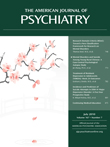Amsterdam and Shults in this issue of the
Journal (
1) present results from their study of patients with bipolar II depression whose depression responded to an open-label trial of fluoxetine and who were then randomly assigned to double-blind treatment with fluoxetine, lithium, or placebo. At first blush, the Amsterdam and Shults article appears to answer a long-term controversy over the use of antidepressants in patients with bipolar II disorder. In patients initially found responsive to fluoxetine by achieving a depression score below 8 on the Hamilton Depression Scale and then randomly assigned to continue fluoxetine or to start either lithium or placebo, the fluoxetine group had the fewest recurrences and the lowest hazard ratio for recurrence of depression. Is this answer definitive enough to guide clinical practice?
As someone involved in clinical trials, my bias is that despite their limitations, clinical trials provide us with scientific data that should carry more weight than hypothesis-generating data derived from case/control, retrospective, or case studies. An important strength of this particular study is its detailed application of placebo-controlled, randomized methodology. However, its strength should be juxtaposed to its equally strong limitation of using this methodology in an enriched-responder, small-sample population, where the primary outcome was depression recurrence and not a metric of overall mood stability in this group of patients with bipolar disorder. An enriched maintenance sample may be a reasonable step forward, but a controlled trial of treatment from the initial acute illness to the continuation phase would be a more compelling demonstration of efficacy.
The issue of whether to use antidepressants in bipolar disorder has been passionately debated in the literature, but few long-term, well-controlled studies have been done. There are warnings and cautions about and prohibitions against using antidepressants at any point in a patient's course of illness (
2,
3), but there are others who have pointed to the potential utility of longer-term antidepressants for some patients (
4). Acute studies of antidepressants in bipolar disorder show limited efficacy—although some patients do indeed report benefit—but overall placebo-controlled, double-blind maintenance studies do not demonstrate that antidepressants produce significantly better results than placebo (
5). Even in acute depression, antidepressants, either as monotherapy or as adjunctive therapy, provide little benefit for most patients with bipolar disorder. Bipolar II depression seems to be no different than bipolar I in this regard (
5,
6).
Because the authors made syndromal depression the primary outcome for assessing the benefit of treatment, it may not be surprising that patients treated with lithium did not do as well as those treated with fluoxetine. Lithium treatment also did not do as well as placebo in terms of the time to relapse. However, significant attrition (from 50% of initial sample to about 28 or so randomized to each of three groups, with less than 50% of these patients completing the study for an overall attrition of more than 75%) also needs to be considered as limiting the certainty of the results.
Although depression is a major component of the burden of bipolar disorder, a critical point that needs to be carefully considered in assessing the overall benefit of each treatment is the prevention of mood instability. Amsterdam and Shults clearly define criteria for hypomania and subsyndromal hypomania. Using a Young Mania Rating Scale threshold of ≥8, fluoxetine-treated patients were three times more likely than lithium-treated patients to have a hypomanic study visit; the findings were also present, but attenuated, using a threshold ≥12. Overall, the proportion of patients receiving fluoxetine meeting their various definitions of hypomania was 50% versus about 34% for those patients on blinded lithium or placebo (Table 3: including events noted of mood lability, subsyndromal hypomania, or hypomania). Does this mean fluoxetine treatment prevented the recurrence of depression, but at the risk of some degree of mood instability? This conclusion is reinforced by the Young Mania Rating Scale individual profile plots (Figure 3), which show noticeably greater excursions above 0 for fluoxetine and for placebo, compared to lithium.
These findings of mood instability reinforce the need for caution. While we already know that patients with bipolar II disorder are less prone to hypomania then patients with bipolar I disorder (
7,
8), recent work by Frye et al. (
9) suggests that even subsyndromal low levels of hypomania can be predictive of switch into more manic states and be early warning signs of mood lability. Amsterdam and Shults may also be minimizing the development of mixed states, which have concerned others who study the course of bipolar disorder (
10). For example, their attribution of symptoms such as insomnia to either hypomania or depression based on the rater's judgment is a nonstandard approach that has not been validated by other groups. Can the researchers or the patient know with certainty if insomnia, for example, is due to depression, hypomania, or is part of a complex mixed presentation?
Is there a group of patients who might do better with antidepressants than without them? The clinical message would seem to be there are some patients with bipolar II depression who may benefit from fluoxetine or potentially other SSRI antidepressants, but clinicians need to watch for mood lability and other signs of destabilization. Overall recommendations for long-term treatment of bipolar II depression are not resolved by this study, but neither can we dismiss the apparent well-being of many of the patients in this study.

